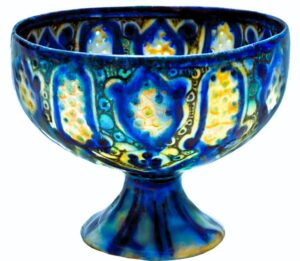
The metaphor in this psalm whispers a message that is incredibly special to me. When I moved into my home twenty-plus years ago, my youngest daughter was helping unpack boxes of dishes and glassware. As she unwrapped a lovely blue goblet, she dropped it and broke it. She was devastated. She apologized for breaking it, and her eyes began to fill with tears. I hugged her and assured her that I had broken many cups and glasses in my time and would likely break more. But for that particular goblet, it would take someone really qualified and experienced in repairing glass to fix it.
This triggered a powerful image of the brokenness and imperfections that we, as individuals, may experience, yet finding restoration and wholeness through the grace and mercy of Jesus. The idea that Jesus is skilled and qualified in fixing our brokenness is a comforting and uplifting message. The imagery of lifting the cup of salvation, unceasingly whole and filled with His gracious mercy, is a poignant reminder of spiritual renewal and redemption.
“What shall I return to the Lord
for all his goodness to me? I will lift up the cup of salvation
and call on the name of the Lord.” (Psalm 116:12-13 NIV). [i]

[ii]
In ancient times, a king customarily held a feast following a great victory. At the feast, he would lift up and drink deeply from a cup of wine as a symbol of deliverance and thanksgiving. Drink offerings were frequently presented in the Bible to thank God for His salvation. In the New Testament, the apostle Paul compared his sacrificial ministry to an act of worship (Philippians 2:17).
Today, in a spiritual sense, God’s people lift up and drink deeply from the cup of thanksgiving for salvation through Jesus Christ. In the face of death, he told Timothy, “For I am already being poured out like a drink offering…” (2 Timothy 4:6).
The “cup of salvation” is also suggestive of God’s good gifts to humans, which David extolled:
“You prepare a table before me
in the presence of my enemies.
You anoint my head with oil;
my cup overflows.” (Psalm 23:5).
In our present society, religious and traditional ceremonies, especially weddings, may include a toast of gratitude, happiness, and hope to those celebrating the event. The exclamation of “Cheers,” is a familiar and recognized acknowledgement.
Offering a toast to God as an expression of faith is a meaningful and personal way to express gratitude and praise. It can be a heartfelt moment where we acknowledge the blessings, salvation, and grace we’ve received. Whether in private prayer or in a communal setting, expressing our faith through a toast is a beautiful way to connect with the divine.
In the first verse of Psalm 116, the writer had cried out to the Lord to save him and had seen the Lord’s answer full of grace and mercy. In response, he said, “I will lift up the cup of salvation and call on the name of the Lord.”
Upon reading this verse, I thought to myself, OK, I have been there. Of all the metaphors in the Bible, this one seems amazingly appropriate. There were times in my life when I became overwhelmed with turmoil. There were times when I felt isolated and abandoned.
I’m thankful for that precious cup of salvation that freed me from my chains, the cup of agony that Jesus pled to have removed from Him if it were His Father’s will (Luke 22:39-43), the cup of the new covenant in His blood (1 Corinthians 11:25), the cup of thanksgiving (1 Corinthians 10:16); I have chipped it, cracked it, dropped it and broken it more times than I care to remember.
But Jesus is really qualified and experienced in fixing broken cups so that when I lift the cup of salvation and call on His name, that cup is unceasingly whole, clean and without blemish because it contains His gracious mercy.
[i] Holy Bible, New International Version®, NIV® Copyright ©1973, 1978, 1984, 2011 by Biblica, Inc.® Used by permission. All rights reserved worldwide. [ii] Image - Public Domain.